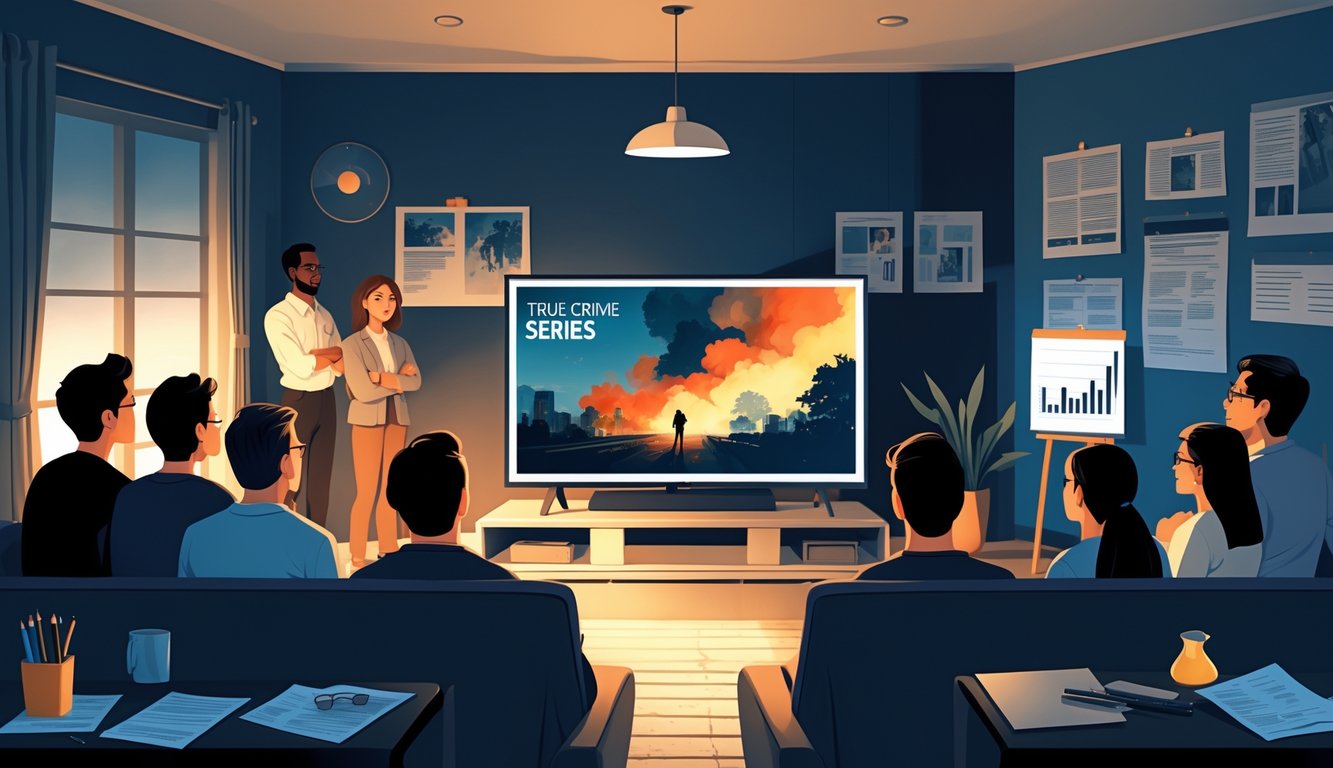
Exploring Social Issues Through True Crime
What actually gets under my skin? The way these shows just shove you into other people’s nightmares, then swerve into legal chaos, and suddenly you’re watching some judge yawn through court. Why do we even want to see this stuff? I’m not pretending it all ties up neatly—half the time, the threads just dangle and nobody circles back.
Trauma and the Victims’ Perspective
Pause? Forget it. As soon as families start talking, everything gets raw. It’s like, “Hey, let’s just rip open that wound again for the camera.” Viewers get front-row seats to pain that never really fades, and I’m not convinced anyone benefits. Scott Bonn, some criminologist, says we get “adrenaline” from this. Sure, maybe, but then we start acting like we’re the heroes in someone else’s horror story. That’s…kind of gross, right?
I’ve seen survivors dragged onto podcasts, barely reading the paperwork before signing up to relive trauma for strangers. There’s this weird tension—public obsession (hello, “Serial” and the Adnan Syed circus) versus any hope of dignity or moving on. Trauma as entertainment. My dermatologist once told me stress ages you faster than the sun. Honestly, I believe her more than half these “experts.”
Systemic Problems in Justice
But what actually drives me up the wall—these Netflix hits never explain why the system keeps failing. You notice how they just breeze past years of lost evidence or some detective’s screw-up? “We’re exposing injustice!” they say, but what about the cold cases that never trend or get a podcast? The AP makes it sound like the genre’s fixing stuff. Is it, though?
Judges make weird calls, DNA kits rot in storage, and then some law student in a hoodie solves more on a podcast than the actual police. Is that a plot twist or just…embarrassing? Appeals get tossed for dumb reasons—people love to bring up Adnan Syed like it’s the only case ever. Control, psychology, whatever—they’re just daily headaches. Like losing your wallet or forgetting your PIN. Do these shows help? Or do we just keep watching because it’s easier than thinking about the mess? Not quitting Netflix, though.
Blurring the Line Between Reality and Fiction
Here’s what I can’t get over: every time I see “based on true events,” I roll my eyes. Read the court files, and suddenly the “killer in plaid” wore a blue hoodie. People I know mix up Netflix’s Dahmer scenes with actual trial footage. There’s some study claiming 30% of viewers can’t tell the difference between made-up details and real reporting. That’s not just a trivia fail—it messes with how we trust, well, everything.
Reality Television versus True Crime Docuseries
Networks still push “reality TV” like it’s just cameras catching real life, but come on—nobody’s having a meltdown with perfect makeup unless there’s a lighting crew. True crime docuseries, though, slap “all facts verified” on the screen and expect us to buy it. I once quoted “The Staircase” in an argument, then found out a real lawyer on Twitter called it total nonsense.
It’s that weird overlap: reality TV wants drama, big tears, wild outfits. True crime docuseries? They give you police audio, stats, and then toss in a moody reenactment or two. There’s even research about the “CSI Effect”—jurors get disappointed when real forensics isn’t as flashy as TV (source). So when someone says, “This is absolutely true,” I pretty much side-eye the whole thing while still binging every episode.
Docuseries Inspired Dramas
Docuseries-inspired dramas? They’re the worst for memory. Writers take a real trial, add ten whispery threats and a bunch of weird lighting, and invent side characters that probably never existed. “Dahmer,” “Mindhunter”—people act like they’re documentaries. I tried cross-checking with real court transcripts—plotlines get totally warped, suspects turn into misunderstood anti-heroes. Who’s got time to fact-check after a binge?
Dermatologists say SPF 30 is enough. Do I ever remember to reapply? Nope. Same energy: we expect these shows to teach us, but they’re just slick infotainment. Even media scholars keep warning that mixing real clips with fiction makes us all a little dumber about what’s true. Maybe next time they’ll slap a giant “reenactment” warning on screen, like calories on a candy bar. Or not. I also wish for a phone battery that lasts all day, so.
Memorable Cases and Characters Boosting Ratings
I can’t scroll Netflix or open Spotify without getting smacked in the face by some new true crime drama—just a parade of infamous names and random weird facts everyone acts like they always knew. The wild part? It’s always the wackiest cases, the ones with pizza bombs or cults, that turn people into amateur detectives overnight.
Serial Killer Stories: The Family, Evil Genius, and More
Last week, someone at work said, “You have to watch The Family, it’s wild.” Nobody cares about the camera work—it’s all about the bizarre details. “Evil Genius” is a pizza delivery guy with a bomb collar and a bank heist. Who even comes up with that? Netflix keeps betting on these stories because, honestly, the ratings jump—AP says it’s up to 35%—when there’s a cult or a serial killer.
Richard Ramirez, the Night Stalker, had LA so freaked out people left their porch lights on for years. Now he’s a Netflix staple. College students can rattle off every plot twist but can’t name five presidents. It’s kind of hilarious—what makes these cases stick? Weird nicknames, media frenzies, unsolved endings. Nobody remembers the quiet ones.
I doubt Netflix ever thought a boring case would go viral. It’s not about justice—it’s about spectacle, hype, and sometimes, pizza. Whatever works.
Unbelievable and the Power of Narrative
Someone texted me at 1 a.m., “Watch Unbelievable, it’s not like the others.” Suddenly, my group chat’s arguing about police paperwork and how victims get treated. The odd thing? “Unbelievable” skips the flashy stuff and just shows the endless slog—detectives, bureaucratic messes, all the ways real life refuses to wrap up neatly.
Researchers (check Stat Significant) say series with long, messy narratives and shifting POVs actually hook people more than the gory stuff. The real draw? Those endless, frustrating details and emotional chaos. People scream at the TV not because of a shadow in the hallway, but because the system’s impossible to navigate.
Nobody cares about the set design—just that awful “Wait, this could happen to me” feeling. My cousin watched all eight episodes, napped, then rewatched the ending just to double-check the courtroom scenes. Narrative immersion isn’t neat. It’s kind of annoying, kind of addictive, and way more effective than any twist ending.



